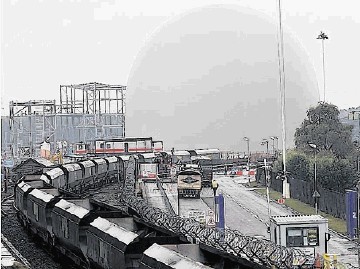
Drax is aiming to become “carbon negative” by 2030, in what the company claims is a world-first move to tackle climate change.
Under the plans, Drax will burn wood pellets at its power plant in North Yorkshire – which is already largely powered by the renewable fuel – and use technology to capture and store the carbon emissions produced.
As the trees will have absorbed carbon dioxide while growing, more carbon will be removed from the atmosphere than is produced throughout the company’s operations – making it carbon negative, Drax said.
A pilot for the process, known as bioenergy with carbon capture and storage (Beccs), at the North Yorkshire site is capturing a tonne of carbon dioxide a day.
The company said it needs effective policy and investment from the next government to help scale up the scheme and develop the transport and storage network to permanently store the carbon emissions.
Drax, the largest power station in the UK, used to run on coal, but has converted four of its six units to burning wood pellets, or biomass, as the UK moves away from the highly polluting fossil fuel.
Biomass has been controversial with some environmental campaigners, amid concerns about the amount of carbon dioxide burning plant material for power creates and where it is sourced from.
But Drax says it sources wood from sustainably-managed forests.
It hopes to be able to install the technology at two of its biomass units by 2030, taking eight million tonnes of carbon dioxide out of the atmosphere a year – with the potential to double that if the system was applied across all four biomass units.
Chief executive Will Gardiner, who is speaking at a Powering Past Coal Alliance event at the UN climate talks in Madrid, said: “Drax’s ambition is to be carbon negative by 2030.
“Having pioneered the use of sustainable biomass, Drax now produces 12% of the UK’s renewable electricity.
“With the right negative emissions policy, we can do much more, removing millions of tonnes of emissions from the atmosphere each year.
“The UK Government is working on a policy and investment framework to encourage negative emissions technologies, which will enable the UK to be home to the world’s first carbon negative company.
“This is not just critical to beating the climate crisis, but also to enabling a just transition, protecting jobs and creating new opportunities for clean growth – delivering for the economy as well as for the environment.”
The company has also announced plans to potentially transform one or two of its remaining coal units to gas and build up to 200 megawatts of battery storage onsite.
